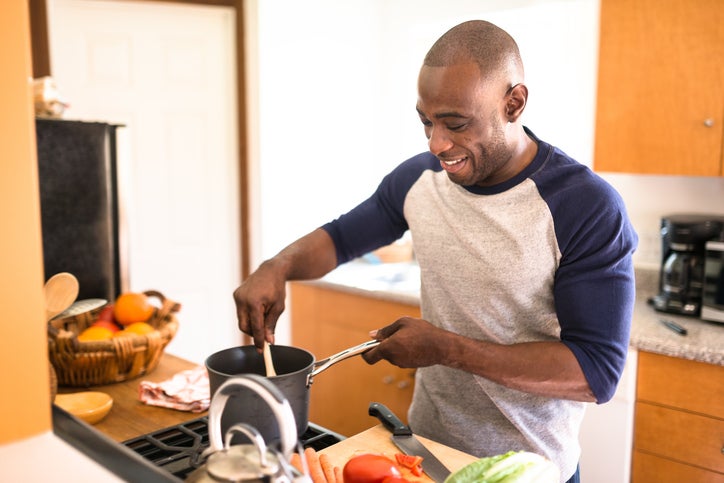3 Time-Saving Veg Cooking Tips

man standing happiness on the kitchen
Veg Cooking Tip # 1: Steam greens as you cook grains.
Looking to speed up meal prep for the week ahead? If you already cook grains in batches to save time during the week, you can save even more time by cooking greens simultaneously. When there are about 3-5 minutes left in cooking time for a large pot of grains, open the pot cover and add a few handfuls of the shredded green of your choice on top of the grain. As long as you don’t mind your foods touching, at the end of the grain cooking time not only will you have a pot of grains to eat throughout the week, you’ll also have wilted greens ready to be added to sautés, salads, or served in a grain bowl.
Veg Cooking Tip # 2: Cook dried beans in a slow cooker overnight.
Want a hands-off way to cook beans from scratch? Place dried beans (soaked or not) in a slow cooker, cover with about 4 inches of water, and place the slow cooker on low before you turn in for the night. By the time you wake up, you’ll have a batch of cooked beans ready to be eaten in soups, salads, or even frozen for later use.
Veg Cooking Tip # 3: Keep the liquid from canned beans.
Out of flax and chia seeds but in a pinch for a vegan egg replacement? The liquid from a can of beans (also referred to as aquafaba — Latin for bean water) can act as an egg replacer in recipes where eggs would act as a binder and add moisture like in cookies and cakes. Three tablespoons of aquafaba can replace 1 egg and liquid from chickpeas and white beans usually works best due to its neutral color.
Kayleen St. John works with NYC’s Natural Gourmet Institute. Kayleen has a Master’s degree in clinical nutrition from NYU and is a registered dietitian. Her research examines the relationship between diet and inflammatory conditions. Vegetarian Times has partnered with the New York-based culinary school to create a comprehensive online course, Foundations of Plant-Based Nutrition.